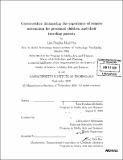| dc.contributor.advisor | Christopher Schmandt. | en_US |
| dc.contributor.author | Modlitba, Lisa Paulina | en_US |
| dc.contributor.other | Massachusetts Institute of Technology. Dept. of Architecture. Program in Media Arts and Sciences. | en_US |
| dc.date.accessioned | 2009-08-26T16:59:16Z | |
| dc.date.available | 2009-08-26T16:59:16Z | |
| dc.date.copyright | 2008 | en_US |
| dc.date.issued | 2008 | en_US |
| dc.identifier.uri | http://hdl.handle.net/1721.1/46591 | |
| dc.description | Thesis (S.M.)--Massachusetts Institute of Technology, School of Architecture and Planning, Program in Media Arts and Sciences, 2008. | en_US |
| dc.description | Includes bibliographical references (p. 143-148). | en_US |
| dc.description.abstract | In recent decades, families in the Western world have become more geographically distributed. Business traveling - the kind of traveling that tends to separate family members - is still a very common phenomenon and keeps making it difficult for family members to maintain a feeling of connectedness. Different time zones and contexts are some of many factors that make "being together" more challenging when physically apart. Modern communication technologies, such as phones and IM clients, improve communication, but seldom achieve the same level of connectedness and awareness that face-to-face communication does. In addition, when it comes to young children, these communication technologies may not even be an option. This thesis presents a theoretical and practical design project that addresses these travel-related issues. The overall goal of the project has been to (1) define a set of design principles for this type of interaction by studying existing psychology and technology research and literature, as well as by interviewing families, to (2) develop a system that, on the basis of the defined principles, makes remote communication and sharing of experiences easier and more meaningful to preschool children and their traveling parents, and to (3) evaluate the system with real end-users in order to improve the user experience. The outcome of the project is "Globetoddler", a mobile-tangible communication platform, designed explicitly to reconcile differences in both location and time, without compromising the specific needs of the individual users. | en_US |
| dc.description.statementofresponsibility | by Lisa Paulina Modlitba. | en_US |
| dc.format.extent | 148 p. | en_US |
| dc.language.iso | eng | en_US |
| dc.publisher | Massachusetts Institute of Technology | en_US |
| dc.rights | M.I.T. theses are protected by
copyright. They may be viewed from this source for any purpose, but
reproduction or distribution in any format is prohibited without written
permission. See provided URL for inquiries about permission. | en_US |
| dc.rights.uri | http://dspace.mit.edu/handle/1721.1/7582 | en_US |
| dc.subject | Architecture. Program in Media Arts and Sciences. | en_US |
| dc.title | Globetoddler : enhancing the experience of remote interaction for preschool children and their traveling parents | en_US |
| dc.title.alternative | Enhancing the experience of remote interaction for preschool children and their traveling parents | en_US |
| dc.type | Thesis | en_US |
| dc.description.degree | S.M. | en_US |
| dc.contributor.department | Program in Media Arts and Sciences (Massachusetts Institute of Technology) | |
| dc.identifier.oclc | 422751773 | en_US |
